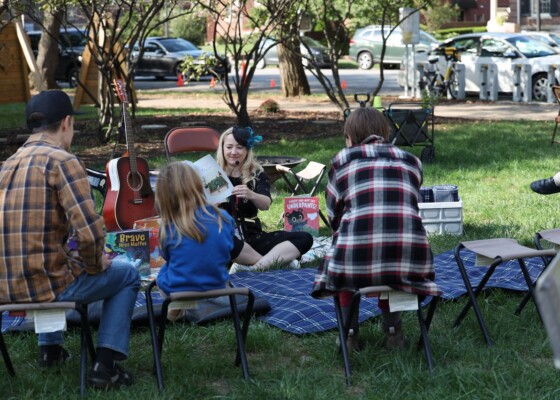Indiana Humanities announces inaugural class of Humanities Action Fellows
October 3, 2019Indiana Humanities has awarded fellowships to eight early-career humanities professionals across the state to help them use the humanities to improve their communities. The inaugural class of Humanities Action Fellows…
Indiana Humanities has awarded fellowships to eight early-career humanities professionals across the state to help them use the humanities to improve their communities.
The inaugural class of Humanities Action Fellows will work over 18 months on projects that range from using storytelling and other public humanities methods to create good policing initiatives to designing public deliberation programs on issues such as race and justice, public well-being and health and community development.
“We’re proud to support this group of young scholars, librarians, curators and educators from across the state,” said Keira Amstutz, president and CEO of Indiana Humanities. “As the word ‘action’ implies, we selected folks who share our belief and sense of urgency that the humanities can help Hoosiers have productive conversations about the present and future of their communities.”
Leah Nahmias, director of programs and community engagement at Indiana Humanities, said the first class of fellows are enthusiastic, motivated, thoughtful and unafraid to take risks to put ideas into action.
“We’re eager to see what happens when the creative energy and tireless drive of early-career professionals are matched with resources and mentors that let them test ideas and try new approaches,” Nahmias said.
The fellows will meet quarterly with one another and Indiana Humanities staff to learn best practices for public humanities work, hear from experts in the field and reflect on the progress of their own work. They will receive stipends and have access to additional funding to support, initiate or highlight public humanities activity in their local regions during their fellowships.
The fellows and their projects are:
Caroline Ban, independent scholar (Valparaiso). Ban plans to work with community groups and local law enforcement agencies in northwest Indiana on good policing initiatives, rooted in storytelling and other public humanities methods.
Lauren Daugherty, the Arts-based Wellness Experiences Manager at the Sidney and Lois Eskenazi Museum of Art at Indiana University Bloomington. Daugherty will work to deepen her museum-based art therapy practice, especially the use of contemporary art to generate dialogue on social issues.
Sara Drury, associate professor and chair of the rhetoric department at Wabash College (Crawfordsville). Drury plans to design and scale public deliberation programs on a range of issues such as race and justice, public well-being and health and community development, around Indiana.
Jocelyn Krueger, curator of the permanent art collection at Indiana State University (Terre Haute). Krueger is a transwoman artist who will be experimenting with projects that collect, exhibit and preserve the stories and voices of marginalized people in the Wabash Valley region.
Becca McNair, youth programming specialist at the Cleo Rogers Memorial Library (Columbus). McNair will work with local youth to design forums and workshops about the future of Columbus, as well as explore the potential of libraries to shape communities’ futures by activating teens in the planning process.
Elizabeth Nelson, assistant professor of medical humanities and health studies at IUPUI coordinator of The Indiana Women’s Prison History Project (Indianapolis). Nelson, who works with currently and formerly incarcerated scholars to research the history of women’s incarceration in Indiana, will provide research support for the scholars on the inside and facilitate the project’s public-facing initiatives and collaborations.
Kara Pickens, an English language arts instructor who teaches dual-credit classes at Spring Valley Junior-Senior High School through Ivy Tech Community College (French Lick). Pickens will use her fellowship to create community storytelling initiatives, including festivals, performances and workshops, in Orange County.
Ryan Schnurr, a writer from northeastern Indiana and an editor at Belt Magazine (Fort Wayne). Schnurr hopes to develop a community memory/storytelling project that helps Fort Wayne residents grapple with the rapid pace of changes taking place in their city.
For more information on the fellows and their academic and professional backgrounds, go to https://indianahumanities.org/programs/fellows.


